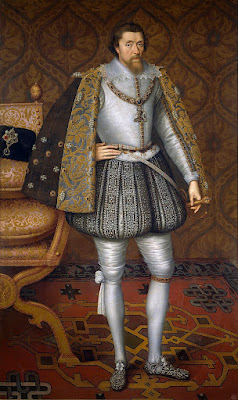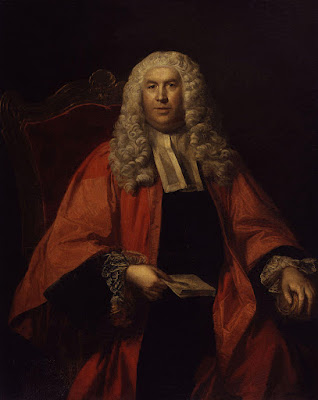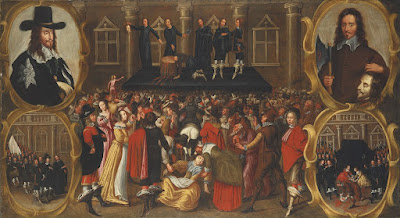“All regal governments must be either hereditary or elective : and, as I believe there is no instance wherein the crown of England has ever been asserted to be elective, except by the regicides [or “king-killers”] at the infamous and unparalleled trial of king Charles I, it must of consequence be hereditary.”
Blackstone’s hero was Sir Edward Coke, a nemesis of King Charles the First
Sir William Blackstone was a great fan of Sir Edward Coke (whose last name is pronounced “Cook”). But Sir Edward Coke was one of the enemies of King Charles the First. Thus, it might seem strange that Blackstone condemned those who executed his hero’s nemesis (as shown above). But it’s not as strange as you might think, if you consider some of the context. This post will show some of this sometimes-missing context. Thus, it will help to explain some parts of Blackstone’s “Commentaries” that have not aged well today. For example, it will help to explain why Blackstone was a monarchist – albeit a constitutional monarchist.
Sir William Blackstone
Queen Elizabeth had appointed Sir Edward Coke to important positions …
Blackstone’s hero Sir Edward Coke is most famous today for writing the “Institutes of the Laws of England.” The only part thereof to be published within Coke’s lifetime was the First Part, published in 1628 – long before Sir William Blackstone had even been born. Like many authors before and since, Sir Edward Coke began his magnum opus with a preface. But instead of calling it a “preface,” he gave it the Latin title of “Deo Patriæ Tibi, Proæmium” (the text of which is available here). In it, he mentions Queen Elizabeth the First (then the only “queen Elizabeth” in English history), who had appointed him (Sir Edward Coke, that is) as “Solicitor General of England and Wales” in 1592. Two years after that, Elizabeth also had appointed Coke as “Attorney General of England and Wales” in 1594. This may help to explain why Coke gives some extensive praise of Queen Elizabeth in the passage mentioning her. Here is the context:
Sir Edward Coke
Queen Elizabeth the First
… so Coke had praised her generously in his “Institutes of the Laws of England”
After listing a number of judges, Sir Edward Coke says that they were “all honoured and preferred by that thrice noble and vertuous queen Elizabeth of ever blessed memory. Of these reverend judges,” Coke continues, “and others their associates, I must ingenuously confess, that in her reign I learnt many things, which in these Institutes I have published: and of this queen I may say, that as the rose is the queen of flowers, and smelleth more sweetly when it is plucked from the branch, so I may say and justify, that she by just desert was the queen of queens, and of kings also, for religion, piety, magnanimity, and justice; who now by remembrance thereof, since Almighty God gathered her to himself, is of greater honour and renown than when she was living in this world. You cannot question what rose I mean; for take the red or the white, she was not only by royal discent and inherent birth-right, but by roseal beauty also, heir to both.” (see source)
Sir Edward Coke
Queen Elizabeth the First
Sir Edward Coke also praises King James somewhat, who had both appointed and dismissed him
Later in this same preface, Sir Edward Coke also mentions “king James.” At the time that Coke wrote this in 1628, there had been only one “king James” in England. He was James the Sixth of Scotland, but he had also become “James the First” of England. Thus, Coke had to be referring to him in this passage. King James had earlier appointed Coke as the “Chief Justice of the Common Pleas” in 1606. But Coke had made a number of unpopular decisions in this capacity (especially Dr. Bonham’s Case), which King James didn’t really care for. Thus, seven years after that, James instead transferred Coke elsewhere, by appointing him as the “Chief Justice of the King’s Bench” in 1613. James seems to have felt that Coke could do less damage there than in his prior position. But on the advice of Francis Bacon, King James later dismissed Coke even from that King’s Bench position. Specifically, Coke was dismissed from that position in 1616. This motivated Coke to return to Parliament instead. Nonetheless, Coke praises James somewhat in that same preface. Specifically, he said that “In the reign of our late sovereign lord king James of famous and ever blessed memory.” (see source) Thus, Sir Edward Coke praised both of the monarchs who had appointed him to important positions, although he limited his praise of “king James” to just a portion of a sentence there. His praise of “king James” thus seems to have been a little less effusive than that given to Elizabeth – perhaps partially because King James’ appointment of Coke had later been followed by entirely dismissing him from the English court system.
Sir Edward Coke
James the Sixth of Scotland, and James the First of England – the man that Coke was thus mentioning
Conspicuous by its absence is any praise for the then-current monarch, Charles the First
Conspicuous by its absence in this preface, though, is any praise at all of the then-current monarch, King Charles the First. In fact, there is not a word about Charles there. With King Charles the First, Coke’s attitude seems to have been somewhat different. Charles had become king in 1625, and Coke was writing (or at least publishing) the preface to these Institutes three years later in 1628 – when Charles was still king. Why did Sir Edward Coke not praise the then-current monarch? Basically, it was because the two men didn’t get along very well. Coke seems to have held even greater resentment against Charles than he had held against King James for dismissing him, and so did not praise Charles at all. Sir Edward Coke was the author of the “Petition of Right,” then the most significant law passed since Magna Carta. As I describe in another blog post, this law placed some new limits upon King Charles the First and his successors. This is not the kind of document that kings like to sign, of course, but the king discovered that the Parliament wouldn’t grant him any money for his war effort unless he agreed to sign this petition into law. Thus, King Charles would reluctantly sign Coke’s “Petition of Right” in 1628, the same year that this preface to Coke’s “Institutes” was published. Thus, it seems safe to say that no love was lost between the two men. They seem to have been a little antagonistic. One might even say that they were enemies.
Sir Edward Coke
King Charles the First
If Blackstone admired Coke, why did he condemn the execution of Coke’s nemesis?
Sir William Blackstone must have been aware of these things when he praised Sir Edward Coke, in Blackstone’s own famous “Commentaries on the Laws of England.” This was in the 1760’s, more than a century after the deaths of both Sir Edward Coke and King Charles the First. Specifically, Blackstone says there that “Some of the most valuable of the ancient reports are those published by lord chief justice Coke; a man of infinite learning in his profession, though not a little infected with the pedantry and quaintness of the times he lived in, which appear strongly in all his works. However his writings are so highly esteemed, that they are generally cited without the author's name [footnote].” (Source: Blackstone’s Introduction to his own work, Section 3) More about that in another blog post. But after Coke’s death, there was an uprising against King Charles the First. It was simply called the “English Civil War.” It eventually led to the execution of King Charles the First in 1649. More than a century after this execution, Blackstone condemned this king’s executioners in the same work, the “Commentaries on the Laws of England.” Blackstone first noted that the crown “is in general hereditary, or descendible to the next heir, on the death or demise of the last proprietor. All regal governments must be either hereditary or elective,” he said, and as “I believe there is no instance wherein the crown of England has ever been asserted to be elective, except by the regicides [or “king-killers”] at the infamous and unparalleled trial of king Charles I, it must of consequence be hereditary.” (Source: Book 1, Chapter 3) Since “king Charles I” had been executed following his trial, Blackstone must have been condemning this execution in this passage.
Oliver Cromwell, one of those who had voted to execute King Charles the First
Trial of King Charles the First, 1649
In part, because Blackstone believed that “the king can do no wrong”
Indeed, Blackstone also said that “Where the magistrate, upon every succession, is elected by the people, and may by the express provision of the laws be deposed (if not punished) by his subjects, this may [appear] like the perfection of liberty, and look well enough when delineated on paper; but in practice will be ever productive of tumult, contention, and anarchy.” (Source: Book 1, Chapter 3) This also helps to explain why Blackstone made one of his most unpopular statements. Specifically, Blackstone said in a later book of the “Commentaries” the following: “That the king can do no wrong, is a necessary and fundamental principle of the English constitution: meaning only, as has formerly been observed, that, in the first place, whatever may be amiss in the conduct of public affairs is not chargeable personally on the king; nor is he, but his ministers, accountable for it to the people: and, secondly, that the prerogative of the crown extends not to do any injury; for, being created for the benefit of the people, it cannot be exerted to their prejudice.” (Source: Book 3, Chapter 17) By modern American standards, Blackstone was obviously wrong when he said that “the king can do no wrong.” But in fairness to Blackstone, this passage is often quoted out of context by his detractors today. Blackstone gives some qualifications to this argument that his critics often omit, and whose context I should thus point out.
Sir William Blackstone
Sir William Blackstone
How this statement has often been misunderstood, and even taken out of context
Specifically, in his very first book, Blackstone had made this same argument that “Besides the attribute of sovereignty, the law also ascribes to the king, in his political capacity, absolute perfection. The king can do no wrong.” (Source: Book 1, Chapter 7) But later on, he qualifies this statement somewhat, saying that “Yet still, notwithstanding this personal perfection, which the law attributes to the sovereign, the constitution has allowed a latitude of supposing the contrary, in respect to both houses of parliament; each of which, in its turn, hath exerted the right of remonstrating and complaining to the king even of those acts of royalty, which are most properly and personally his own; such as messages signed by himself, and speeches delivered from the throne.” (Source: Book 1, Chapter 7) Blackstone later gives another qualification in his very definition of kingship. Specifically, he says that “A third attribute of the king's majesty is his perpetuity. The law ascribes to him, in his political capacity, an absolute immortality. The king never dies. Henry, Edward, or George may die; but the king survives them all.” (Source: Book 1, Chapter 7) Thus, he was defending the monarchy as an institution, not defending particular monarchs against particular charges. Most relevantly, he was not defending King Charles the First, when he condemned those who had voted to execute him. Rather, he just saw it as wrong to execute any king to begin with.
King Charles the First
Statue of Sir William Blackstone
Blackstone was a constitutional monarchist, rather than an absolute monarchist
Blackstone was still wrong, of course. Indeed, it is rightly unpopular today to be considered a “monarchist.” But in fairness to Blackstone, this was the norm in Britain at this time. And, even more importantly, he was a constitutional monarchist – not an absolute monarchist. That is to say, he believed in limits upon the power of the monarchy. At this time, that made him different from most of the king’s supporters. Obviously, Blackstone saw the execution of King Charles the First as illegal and wrong. But that doesn’t mean that he would defend the king, or suggest that he should have absolute power. Indeed (and again), Blackstone supports limits upon the power of the monarchy. For example, he supported the aforementioned “Petition of Right,” written by Sir Edward Coke. In the “Commentaries,” Blackstone said that the fundamental articles of the people’s rights and liberties “have been from time to time asserted in parliament, as often as they were thought to be in danger.” (Source: Book 1, Chapter 1) For example, he says that they were asserted “by the petition of right ; which was a parliamentary declaration of the liberties of the people , assented to by king Charles the first in the beginning of his reign. Which was closely followed by the still more ample concessions made by that unhappy prince to his parliament, before the fatal rupture between them” (Source: Book 1, Chapter 1).
Execution of King Charles the First, 1649
An alternative depiction of the execution of King Charles the First
Blackstone’s ideas were imperfect, but he was still a great thinker (and here’s why)
My point is simply that Blackstone’s argument has sometimes been misinterpreted, and made more extreme than it really was by his time’s standards. Blackstone was still wrong to defend monarchy, but he was actually right about many other things – as I have shown in other posts. It would be a mistake to throw out the baby with the bathwater, and dismiss the contributions of a truly great thinker because of his comments on this one issue. If you want to see what Blackstone got right, see some of the other posts below, or even skim through their titles below. They show (among other things) that Blackstone influenced Abraham Lincoln, that he influenced Alexander Hamilton, and that a number of his ideas entered the United States Constitution. Blackstone is one of the great thinkers of history, and we should not expect perfection of him or his writings. We should instead expect great ideas, which Blackstone provides in abundance.
Footnote: Would Sir Edward Coke have participated in the English Civil War?
Other posts about Sir Edward Coke:
Other posts about Sir William Blackstone:
Part of a series about
Sir Edward Coke
Lord Coke’s career, and how he got along with the monarchs of his time
Part of another series about
Sir William Blackstone
The primary function of government is to protect our most basic rights
Hamilton quoted from Blackstone when discussing the Habeas Corpus Act
Hamilton quoted from Blackstone when discussing the Habeas Corpus Act
Private property is a cornerstone of English-speaking law
There are some rights that exist mainly to protect other rights
How did Sir Edward Coke influence Sir William Blackstone?
The British Parliament was the main model for the United States Congress
5 surprising ways that the Congress was modeled on the British Parliament
Yes, Blackstone was a monarchist – but not an absolute monarchist
Difference between the presidency and the prior British monarchy
How did the Founding Fathers use Blackstone's writings about the monarchy?
Giving Congress the power to coin money was a break with British precedents
How the legislature can give legal permission to be a “pirate” (er, “privateer”)
What is “corruption of blood, or forfeiture” from an attainder of treason?
There are some rights that exist mainly to protect other rights
How did Sir Edward Coke influence Sir William Blackstone?
The British Parliament was the main model for the United States Congress
5 surprising ways that the Congress was modeled on the British Parliament
Yes, Blackstone was a monarchist – but not an absolute monarchist
Difference between the presidency and the prior British monarchy
How did the Founding Fathers use Blackstone's writings about the monarchy?
Giving Congress the power to coin money was a break with British precedents
How the legislature can give legal permission to be a “pirate” (er, “privateer”)
What is “corruption of blood, or forfeiture” from an attainder of treason?




















No comments:
Post a Comment